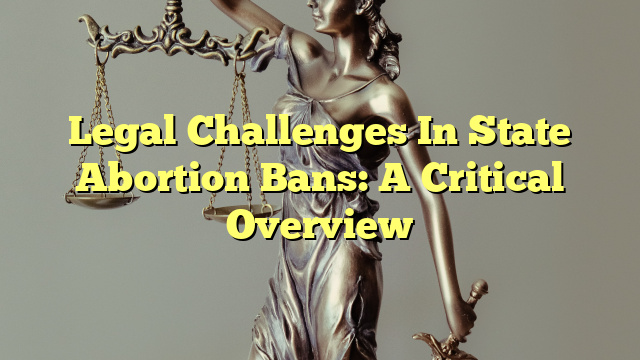Table of Contents
The Impact of the Dobbs Decision
The recent Dobbs decision has had a significant impact on the landscape of state abortion bans. The Supreme Court’s ruling in Dobbs v. Jackson Women’s Health Organization effectively overturned the viability standard established by Roe v. Wade, allowing states to enact more restrictive abortion laws.
As a result, many states have seized the opportunity to pass laws that severely limit access to abortion services. These state abortion bans have faced legal challenges from reproductive rights advocates, leading to a critical examination of their constitutionality.
The Dobbs decision has sparked a renewed debate over the balance between a woman’s right to choose and the state’s interest in protecting fetal life. It has also raised concerns about the potential erosion of reproductive rights and the impact on marginalized communities who may face disproportionate barriers to accessing abortion care.
What is the Dobbs Decision?
The Dobbs decision refers to the Supreme Court case of Dobbs v. Jackson Women’s Health Organization, which challenged a Mississippi law that banned most abortions after 15 weeks of pregnancy. In a 6-3 decision, the Court upheld the Mississippi law, effectively allowing states to impose more restrictive abortion bans.
By overturning the viability standard set by Roe v. Wade, the Court’s ruling in Dobbs has given states greater leeway in regulating abortion. This decision has been hailed by anti-abortion advocates as a significant victory, while reproductive rights advocates have expressed deep concerns about the potential consequences for women’s access to reproductive healthcare.
Are Ectopic Abortions Legal in Oklahoma?
Yes, ectopic abortions are legal in Oklahoma. Ectopic pregnancies occur when a fertilized egg implants outside of the uterus, typically in the fallopian tube. These pregnancies are not viable and pose serious health risks to the pregnant person.
Oklahoma recognizes the medical necessity of terminating an ectopic pregnancy to protect the health and well-being of the pregnant person. However, it is important to note that the legality of abortion in general is subject to state laws, and access to abortion services may vary depending on the specific circumstances and regulations in place.
What is the Trigger Ban?
The trigger ban refers to a type of abortion restriction that automatically goes into effect if Roe v. Wade is overturned or significantly weakened. These bans are designed to “trigger” the prohibition of abortion in a state, often without exceptions for cases of rape, incest, or fetal abnormalities.
Trigger bans vary from state to state, with some enacting complete abortion bans and others imposing severe restrictions. The purpose of these bans is to create a legal framework that would criminalize abortion in the event that the Supreme Court reevaluates or overturns its previous rulings on abortion rights.
It is important to note that trigger bans are not currently in effect in all states, but they represent a concerning trend among anti-abortion lawmakers who seek to limit or eliminate access to abortion services.

